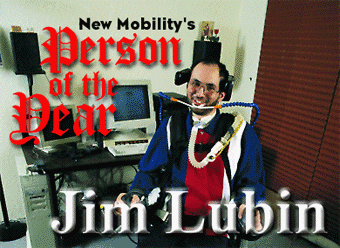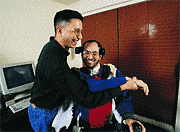|
Jim Lubin sips and puffs in Morse code to manage several Web sites for people with disabilities. A sip is a dot and a puff is a dash. BY JEAN DOBBS As usual, we solicited your nominations for our Person of the Year award in September. You did your work well, and tipped us to dozens of people who made noteworthy contributions to our
Jim Lubin is sipping and puffing. Playing and programming. Learning, sharing, living. He's building virtual communities, and he's doing it one breath at a time with Morse code. Fleshing out those stingy dots and dashes to create a full life for himself and a smorgasbord of resources for others.
Lubin is the man who nurtures these virtual fellowships, defends them from spam, and offers visitors sanctuary among those who understand. And especially for the visitors with transverse myelitis, that understanding is one thing they can't find anywhere else. "When I first got TM, I truly thought that I was the only one who had this," writes Sharon, a member of Lubin's Transverse Myelitis Internet Club. "No one gave me any information on how to find anyone else." "You've blazed more trails than most so-called 'providers,' 'experts,' and 'gurus' can imagine," says Dave. "The support I feel from your club is overwhelming!" says Lynn. "It seems there are disagreements and controversies, but when the chips are down, we're all in this together." Lubin, 31, began his own struggle with transverse myelitis at 21, when he woke one morning with a sore shoulder. Thinking nothing of it, he popped some Tylenol and went to work at Heart Technologies, a maker of angioplasty devices, where he supervised the assembly department. But within an hour, the sore shoulder escalated into a paralyzing inflammation of Lubin's spinal cord. Suddenly, he lost his voice, stumbled, lost consciousness. His heart stopped. The paramedics said he would probably die. But then Lubin heard his mother's voice when she arrived on the scene. It tugged him back to this world. "My mom" he says, "is my hero." Diagnosed with acute transverse myelitis, Lubin became the highest of quads and thus, a vent-user. That was almost 10 years ago, and he has spent much of the last decade researching TM, a syndrome that manifests itself in unique ways for each survivor (see sidebar). In 1996, he started putting information online, linking people to each other and to other resources.
The hospital, the University of Washington Medical Center, didn't have many computer programs, so Lubin imported some from home. He practiced Morse code on a Hangman program and got his therapists hooked on computer games. Soon, he realized that he knew more about computers than many of the occupational therapists, and began helping them in their student lab. "They said, 'We should start paying you,'" he recalls. Lubin says a job like that would have been ideal, but after his private insurance ran out, he faced the classic employment trap for people with high-level disabilities: If he worked, he'd lose his Medicaid benefits, and he could never make enough to pay for the ventilator-related costs himself. "That really frustrated me," he says. "I was the kind of person who worked through lunch, came in early, stayed late. They had to tell me to take my breaks because I enjoyed my work so much." As Lubin studied his options, he knew what he had to do. "I could have given up on life, lay in bed and felt sorry for myself," he says. Instead, he did some programming for his old company in exchange for upgraded computer equipment. He laid the foundation for his new life. He adapted.
Today, the quad life is routine. Up at 7 a.m., in goes the one-way speaking valve, on goes CNN, up goes the head of the bed, down go the meds. Brush teeth, suction toothpaste. Down goes the bed for range-of-motion exercises. If the news is dull, Mom puts in a tape of the 5 a.m. Mass that the family records daily. Sponge bath, cath and trach care. Dress, fasten a head brace for the transfer to the wheelchair. Switch on the chair ventilator, throw on some blankets and position the sip-and-puff straw for driving. Then he's ready to wheel into the breakfast nook and log on to his computer. Once he's there, time flies. "I'm usually too wrapped up doing something on the computer to stop and eat," he says. "I never seem to have enough time to finish everything I want to do." Although he no longer has 24-hour nursing services, there is always a nurse or family member within earshot. A baby monitor sits near Jim so they can hear him call or hear the ventilator alarm. His greatest fear is that the vent will stop and no one will be there to help. The system has worked so far--his mother or brother has interceded the three times that the machine conked out--but there is, of course, a price to pay. Privacy. "That's been one of the hardest things," Lubin admits. And it's one reason he doesn't use voice recognition software, even though his speech is now unhindered by the vent. "I can't breathe at all on my own, not even for a few minutes," he says. "So I need people around all the time. The nurses sit in another room, but with the baby monitor they can still hear everything I'm doing. And we want them to hear what I'm doing, but if I had voice recognition for the computer, then I would have no privacy when I was writing my e-mail. With the Morse code, it's just like I'm typing, and no one knows what I'm typing." What he's probably typing is e-mail to people who've asked him obscure questions about TM or who are longing for contact with other survivors. "So little is known about transverse myelitis that people affected by it often feel isolated," Lubin says. "Most of us had not even heard of another person with TM before finding each other online." So Lubin views the TM Internet Club as his greatest achievement. "It's really satisfying," he says. "I'm able to help a lot of people. That's the same reason I enjoyed my job [at Heart Technologies] so much--I felt like I was part of something that was making people better."
The transition to a new life wasn't entirely smooth. After Lubin's private insurance ran out, the 24-hour-a-day nurses promptly quit coming, and it took six months to get Medicare. Lubin's father had died in 1986, and his brother, Joe, an army private, was stationed in Korea. Jim's mother, Helena, faced the hardest time of her life. She had to quit her job at an escrow company to do Jim's care, and then two weeks later, her father died of cancer. She became Jim's 24-hour-a-day nurse, and used her entire inheritance and retirement account to pay for ventilator supplies, medication and respite care. "It was just me and my mom for six months," Jim says. "We used up every bit of savings we had for nurses just so my mom could at least get some sleep. Financially, it killed us." "It was a total, total nightmare," Helena says. But the Lubin family is extremely close, and resentment was never part of the equation during those tough times. "It put a strain on me, but not on our relationship," she says. Joe also made a sacrifice. He deferred his dream of joining the army until he had moved the family out of their inaccessible third-floor apartment and helped Jim adjust. "The two of us," says Jim, "have always been each other's best friends." When Joe did finally enter the military, he sent home money that helped keep Jim out of a nursing home. "There is no way on earth that I would ever have him in a group home or a rest home," Helena says. "Out of the question. So Joe going into the army helped out financially. Of course our phone bill was equal to the national debt, but that's OK because we needed that contact." Even now that Medicare-paid nurses come in at night, Helena still does most of Jim's care. "We actually like it better that way," Jim says. "The best days are when it's just me and my mom, or my brother too--the three of us home alone." Their Catholic faith plays a big role in the family harmony. There's comfort, Joe says, "just knowing that there's a reason for everything but not having to explain it." "God did not leave us high and dry," Helena says. "He stripped us of all of our earthly possessions, which we didn't need anyway, and certainly humbled us. But it was also one miracle after another. He always provides. We could be down to our last dime and rolling coins--and I'm not saying that as a joke--and something always happens and we're able to manage." "God had a purpose for me," Jim says. "I have no regrets. I've had a rich, fulfilling life. I don't even regret becoming a quadriplegic. If it hadn't happened, then I wouldn't have had the time or inclination to do what I'm doing now." But Lubin is no martyr. "Many people have told me I am such an inspiration to them," he says, "but I don't really know why, and it makes me a little uncomfortable. I'm just an ordinary person who got sick and found a way that works for me to handle my situation." What does the future hold for Jim Lubin? He's not guessing. "Ten years ago I had a great job that I enjoyed, I seemed to be in good health, I was standing and talking with someone, and then in a matter of minutes, I couldn't stand, couldn't breathe and nearly died. "Five years ago, I never would have imagined getting this [Person of the Year] recognition. "Last year, a person who I communicated with online and considered a friend, died a few days after I last heard from him. He had been a vent-dependent quad for over 20 years." The lesson? "I just try to live each day to the fullest as best as I can and don't plan that far ahead." And his hopes for the future of all people with disabilities? It's about connecting, you guessed it, with computers. "Computers can offer a great improvement in people's quality of life," Lubin says. "There are a lot of people who are shut in completely with no access to the outside world." Access to transportation is vital, he acknowledges, but even if people with disabilities could get around their physical communities better, that wouldn't eliminate the need for virtual contact within the disability community. "With computers we're able to communicate with others who share the same condition," he says. "We're able to learn that we're not alone."
|

